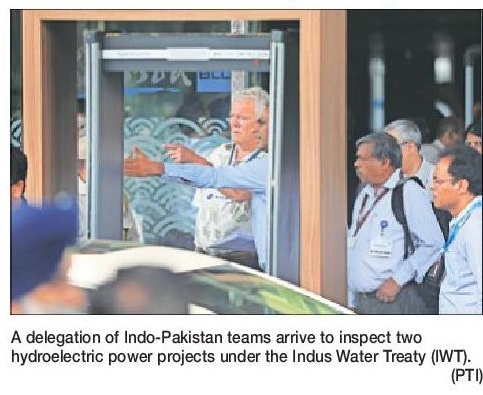India, Pakistan delegations reach J&Kto inspect Indus Water Treaty projects
25 Jun 2024 08:49:47

JAMMU :
DELEGATIONS from India and
Pakistan on Monday flew to
Jammu and Kashmir’s Kishtwar
district with neutral experts
and began inspection of two
power projects under the Indus
Water Treaty (IWT), officials
said. About 40 people reached
Jammu Sunday evening and
flew to Kishtwar this morning
for inspection of various underconstruction power projects in
the Chenab valley region, the
officials said.
This is the first visit by a
Pakistani delegation to Jammu
and Kashmir in more than five years under the dispute settlement mechanism of the
1960 treaty.
India and Pakistan signed
the IWT after nine years of
negotiations, with the World
Bank being a signatory of the
pact which sets out a mechanism for cooperation and
information exchange
between the two sides on the
use of waters of a number of
cross-border rivers.
A three-member Pakistan
delegation inspected the
Pakal Dul and Lower Kalnai
hydroelectric power projects
under the provisions of the
IWT for the last time in
January 2019, before the ties
between the two countries
froze following the revocation of the special status of
Jammu and Kashmir.
Immediately after landing
at an army camp, the delegation visited the National
Hydroelectric Power
Corporation (NHPC) headquarters, the officials said,
adding, they left for the 85 MW
Ratle hydroelectric power
project site at Drabshalla for
dam inspection.
They will also visit the 1,000
MW Pakal Dul hydroelectric
project on river Marusudar,
a tributary of river Chenab,
and other power projects during their stay in Kishtwar, the
officials said.
Pakistan had in a request
to the World Bank in 2016
objected to the design features of the two hydroelectric power projects and
sought a settlement through
a ‘Neutral Expert.’
The country, however, later withdrew the request and
sought adjudication through
a Court of Arbitration. India,
on the other hand, insisted
that the issue should be
resolved solely through
‘Neutral Expert’ proceedings.
After failed negotiations,
the World Bank appointed a
Neutral Expert and the chair
of the Court of Arbitration in
October 2022.
Issuing a notice for the
modification in the Treaty,
India warned that “such parallel consideration of the
same issues is not covered
under any provision of the
IWT.”